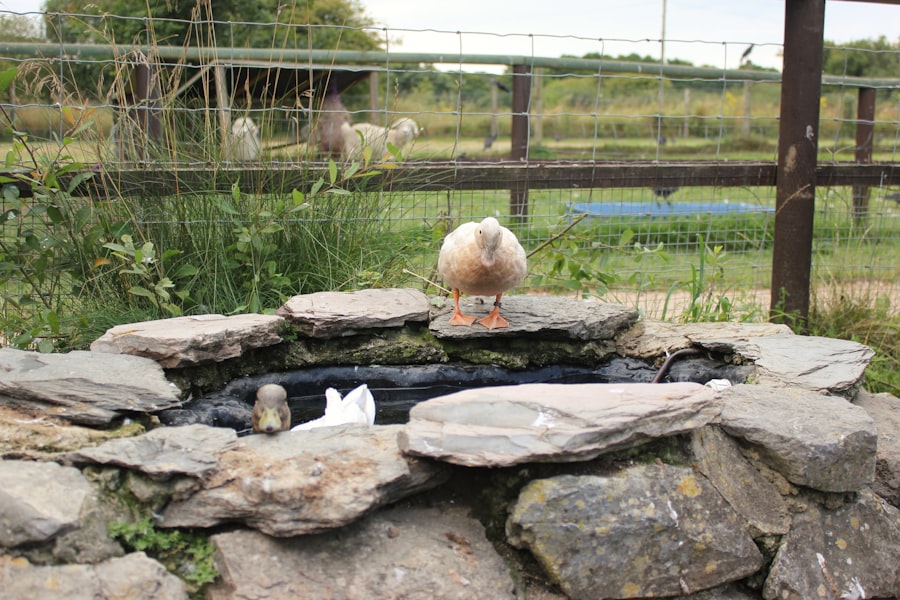Quiet duck breeds are becoming increasingly popular among backyard farmers. These breeds are known for their calm and quiet nature, making them ideal for those who live in residential areas or have close neighbors. Unlike their noisy counterparts, quiet duck breeds do not produce loud quacks that can disturb the peace and tranquility of the surrounding environment. In addition to their quiet nature, these ducks also offer a range of other benefits, making them a popular choice for homesteaders.
Key Takeaways
- Quiet duck breeds are becoming increasingly popular for backyard farming.
- Quiet duck breeds are important for reducing noise pollution and maintaining good relationships with neighbors.
- The top 5 quietest duck breeds for backyard farming are the Swedish, Cayuga, Buff, Welsh Harlequin, and Ancona.
- Characteristics of quiet duck breeds include calmness, docility, and low vocalization.
- Benefits of raising quiet duck breeds include less stress on the birds and easier management for the farmer.
Understanding the Importance of Quiet Duck Breeds
Noisy ducks can be a nuisance to both the farmer and their neighbors. The constant quacking can be disruptive and irritating, especially if you live in a residential area where noise regulations may be in place. This can lead to strained relationships with neighbors and potential complaints to local authorities. By choosing quiet duck breeds, you can avoid these issues and maintain a peaceful environment on your homestead.
In addition to avoiding noise complaints, quiet duck breeds offer a range of benefits for backyard farmers. These ducks are generally more docile and easier to handle, making them suitable for families with children or those who are new to raising ducks. They also tend to be less aggressive towards other animals and are less likely to cause damage to property or crops. Furthermore, quiet duck breeds are often more adaptable to different climates and environments, making them a versatile choice for homesteaders.
Top 5 Quietest Duck Breeds for Backyard Farming
1. Indian Runner Ducks: Indian Runner Ducks are known for their upright posture and distinctive running gait. They are one of the quietest duck breeds, producing soft quacks that are not as loud as other breeds. Indian Runner Ducks are also excellent egg layers, making them a popular choice for those who want both quiet ducks and a good supply of eggs.
2. Cayuga Ducks: Cayuga Ducks are known for their beautiful dark feathers that shimmer with shades of green and purple. They are a quiet breed that produces soft quacks, making them a great choice for those who want a visually stunning and peaceful addition to their homestead. Cayuga Ducks are also good egg layers and have a calm and friendly temperament.
3. Swedish Ducks: Swedish Ducks are known for their striking blue coloration and calm nature. They are a quiet breed that produces soft quacks, making them ideal for those who want a peaceful and visually appealing addition to their backyard farm. Swedish Ducks are also good egg layers and have a friendly and sociable temperament.
4. Khaki Campbell Ducks: Khaki Campbell Ducks are known for their excellent egg-laying abilities, with some individuals laying up to 300 eggs per year. They are a quiet breed that produces soft quacks, making them a popular choice for those who want both quiet ducks and a high egg production. Khaki Campbell Ducks are also easy to handle and have a friendly temperament.
5. Welsh Harlequin Ducks: Welsh Harlequin Ducks are known for their beautiful plumage, which features a mix of white and silver feathers. They are a quiet breed that produces soft quacks, making them an attractive choice for those who want both quiet ducks and visually appealing birds on their homestead. Welsh Harlequin Ducks are also good egg layers and have a calm and friendly temperament.
Characteristics of Quiet Duck Breeds
Quiet duck breeds possess certain physical and behavioral traits that make them quieter than other breeds. Physically, these ducks tend to have smaller bills, which produce softer quacks compared to larger-billed breeds. They also have less vocalization overall, which contributes to their quiet nature.
Behaviorally, quiet duck breeds tend to be more docile and less prone to excessive vocalization. They are generally calmer and less likely to become agitated or stressed, which can lead to loud quacking. Quiet duck breeds are also less territorial and aggressive towards other animals, reducing the likelihood of noisy confrontations.
In contrast, noisy duck breeds tend to have larger bills and are more vocal overall. They may quack loudly and frequently, especially during mating season or when they feel threatened. Noisy duck breeds may also be more territorial and aggressive, leading to loud confrontations with other animals.
Benefits of Raising Quiet Duck Breeds
Raising quiet duck breeds offers a range of benefits for backyard farmers. One of the main advantages is the reduction in noise pollution. By choosing quiet duck breeds, you can avoid disturbing your neighbors and maintain a peaceful environment on your homestead. This can lead to better relationships with your neighbors and a more harmonious living situation.
In addition to reducing noise pollution, quiet duck breeds are generally easier to handle and care for. Their calm and docile nature makes them suitable for families with children or those who are new to raising ducks. Quiet duck breeds are also less likely to cause damage to property or crops, as they are less aggressive towards other animals.
Furthermore, quiet duck breeds are often more adaptable to different climates and environments. They can tolerate a wider range of temperatures and weather conditions, making them a versatile choice for homesteaders. This adaptability can be especially beneficial for those who live in areas with extreme weather or fluctuating temperatures.
Best Practices for Raising Quiet Duck Breeds

To ensure the health and happiness of your quiet duck breeds, it is important to provide them with proper housing and feeding. Ducks require a secure and spacious enclosure that protects them from predators and provides them with enough room to move around. The enclosure should also have access to clean water for swimming and drinking.
Feeding your ducks a balanced diet is essential for their overall health and well-being. Ducks require a combination of commercial feed, fresh vegetables, and access to insects or other protein sources. It is important to provide them with a varied diet that meets their nutritional needs.
To keep your quiet duck breeds calm and content, it is important to create a stress-free environment. This can be achieved by providing them with plenty of space, minimizing loud noises or sudden movements, and ensuring they have access to clean water and fresh bedding. Regular socialization and interaction with your ducks can also help to keep them calm and happy.
Training your ducks to be even quieter can be achieved through positive reinforcement techniques. By rewarding quiet behavior and ignoring or redirecting noisy behavior, you can encourage your ducks to be quieter over time. Consistency and patience are key when training ducks, as it may take time for them to learn new behaviors.
Factors to Consider When Choosing a Quiet Duck Breed
When choosing a quiet duck breed for your backyard farm, there are several factors to consider. The climate and environment in which you live will play a significant role in determining which breed is most suitable for you. Some breeds are more adaptable to cold climates, while others thrive in warmer temperatures.
Egg production and meat quality are also important considerations. If you are primarily interested in egg production, you may want to choose a breed that is known for its high egg-laying abilities. On the other hand, if you are interested in raising ducks for meat, you may want to choose a breed that is known for its meat quality.
Personal preferences and needs should also be taken into account when choosing a quiet duck breed. Consider factors such as size, appearance, temperament, and any specific requirements or preferences you may have. It is important to choose a breed that aligns with your goals and preferences as a backyard farmer.
Common Misconceptions About Quiet Duck Breeds
There are several common misconceptions about quiet duck breeds that need to be addressed. One misconception is that quiet duck breeds are less hardy than noisy breeds. While it is true that some quiet duck breeds may be more sensitive to extreme temperatures or weather conditions, this does not mean they are less hardy overall. With proper care and attention, quiet duck breeds can thrive in a variety of environments.
Another misconception is that quiet duck breeds are less productive than noisy breeds. While it is true that some quiet duck breeds may not lay as many eggs as other breeds, this does not mean they are less productive overall. Many quiet duck breeds are excellent egg layers and can provide a good supply of eggs for your homestead.
Finally, there is a misconception that quiet duck breeds are harder to find and more expensive than noisy breeds. While it may be true that some quiet duck breeds are less common and may require more effort to find, this does not mean they are necessarily more expensive. The availability and cost of different duck breeds can vary depending on your location and the breeder or supplier you choose.
Tips for Keeping Your Quiet Duck Breeds Happy and Healthy
To keep your quiet duck breeds happy and healthy, it is important to provide them with regular check-ups and vaccinations. Ducks can be susceptible to certain diseases and parasites, so it is important to consult with a veterinarian and follow their recommendations for preventative care.
Providing a clean and safe environment is also essential for the well-being of your ducks. Regularly clean their enclosure, provide fresh bedding, and ensure they have access to clean water for swimming and drinking. Ducks also require protection from predators, so it is important to secure their enclosure and monitor for any signs of potential threats.
Socializing and interacting with your ducks regularly can help to keep them happy and healthy. Ducks are social animals that thrive on companionship, so it is important to spend time with them and provide opportunities for socialization. This can include activities such as supervised free-ranging or supervised interactions with other animals.
Why Choose Quiet Duck Breeds for Your Homestead?
In conclusion, quiet duck breeds offer a range of benefits for backyard farmers. Their calm and quiet nature reduces noise pollution and helps to maintain a peaceful environment on your homestead. Quiet duck breeds are also easier to handle and care for, making them suitable for families with children or those who are new to raising ducks.
By choosing quiet duck breeds, you can also enjoy better relationships with your neighbors and avoid potential complaints or conflicts. These ducks are generally more adaptable to different climates and environments, making them a versatile choice for homesteaders.
If you are considering adding ducks to your backyard farm, it is worth exploring the different quiet duck breeds available and considering their characteristics, benefits, and requirements. By choosing the right breed for your needs and preferences, you can enjoy the many advantages that quiet duck breeds have to offer.
If you’re interested in learning about the quietest duck breeds, you might also find this article on how long it takes for chicken eggs to hatch naturally quite informative. Understanding the incubation period can help you plan and prepare for the arrival of your ducklings. Check it out here.
FAQs
What are the quietest duck breeds?
Some of the quietest duck breeds include the Indian Runner, Khaki Campbell, and Swedish Blue.
Why would someone want a quiet duck breed?
Some people may live in areas with noise restrictions or have close neighbors, making a quiet duck breed a more suitable option. Additionally, some people may simply prefer a quieter environment.
Are all duck breeds noisy?
No, not all duck breeds are noisy. Some breeds are naturally quieter than others.
What factors contribute to a duck breed’s noise level?
A duck breed’s noise level can be influenced by genetics, environment, and individual temperament.
Can a noisy duck breed be trained to be quieter?
While it may be possible to train a duck to be quieter, it is important to remember that genetics and individual temperament play a significant role in a duck’s noise level.
What are some other factors to consider when choosing a duck breed?
Other factors to consider when choosing a duck breed include egg production, temperament, size, and purpose (meat or egg production).
Meet Walter, the feathered-friend fanatic of Florida! Nestled in the sunshine state, Walter struts through life with his feathered companions, clucking his way to happiness. With a coop that’s fancier than a five-star hotel, he’s the Don Juan of the chicken world. When he’s not teaching his hens to do the cha-cha, you’ll find him in a heated debate with his prized rooster, Sir Clucks-a-Lot. Walter’s poultry passion is no yolk; he’s the sunny-side-up guy you never knew you needed in your flock of friends!







